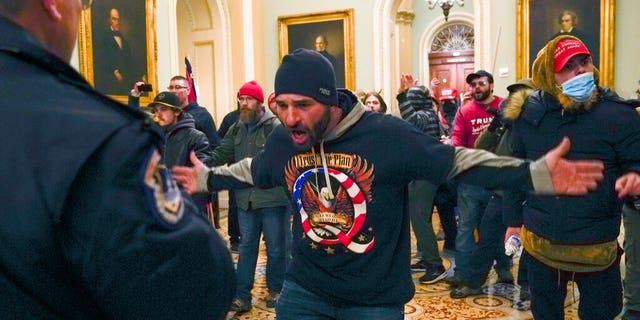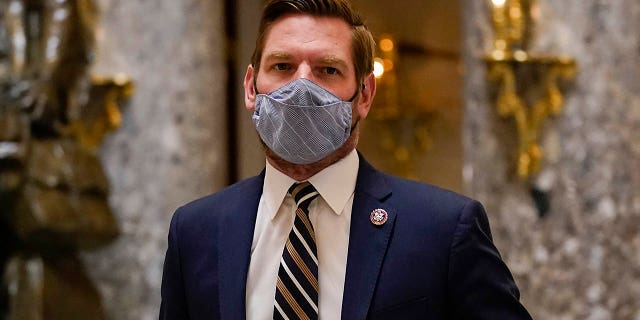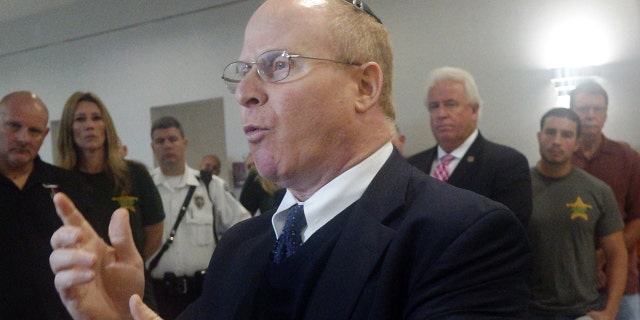Former President Donald Trump has been out of office for nearly three weeks, but he is still expected to command the full attention of the legislative branch and the country in the coming days as the Senate begins his second impeachment trial, barely one year after his first.
The former president was impeached on Jan. 13, just one week after a pro-Trump mob overtook the Capitol as Congress and former Vice President Mike Pence were certifying the results of President Biden’s win in the 2020 election.
WHEN DOES THE TRUMP IMPEACHMENT TRIAL START AND HOW DO I WATCH?
Democrats in Congress, and even some Republicans, were outraged that the former president had gathered a rally in Washington, D.C., that day where he repeated his false claims that he won the presidential election and said he did not do enough to stop the attack once his supporters began to breach the Capitol about one hour after his rally’s conclusion.
But Trump’s defenders say he is not responsible for the actions of the criminals that menaced lawmakers and attacked police, and note that later in the day he told his supporters in a Twitter video to go home.

President Donald Trump arrives to speak at a rally Wednesday, Jan. 6, 2021, in Washington. (AP Photo/Jacquelyn Martin)
As the trial begins, Trump’s lawyers are also expected to argue that the Senate can no longer constitutionally convict Trump now that he is out of office — and the House impeachment managers are expected to dispute that — in an affair that represents the finale of Trump’s tumultuous first term, even as rumors persist he may run for a second in 2024.
Here’s what you need to know about Trump’s impeachment trial.
What’s Trump accused of?
Incitement of insurrection is the fundamental charge behind the impeachment article. But that assertion is backed up by the impeachment managers with a litany of other charges about what actions from Trump incited the insurrection and why.

In this Jan. 6, 2021, file photo, violent rioters, loyal to President Donald Trump, storm the Capitol in Washington. (AP Photo/John Minchillo, File)
Those include that Trump lied about the results of the presidential election; that he tried to subvert the accurate and fair result of the election; and that he sent the mob of his supporters to the Capitol.
“He also willfully made statements that, in context, encouraged – and foreseeably resulted in – lawless action at the Capitol, such as: ‘if you don’t fight like hell you’re not going to have a country anymore,'” the impeachment article says of the Jan. 6 “Save America Rally” Trump organized.
“Thus incited by President Trump, members of the crowd he had addressed … unlawfully breached and vandalized the Capitol, injured and killed law enforcement personnel, menaced members of Congress, the vice president, and congressional personnel, and engaged in other violent, deadly, destructive and seditious acts,” it continues. The article says the mob aimed to “interfere with the joint session’s solemn constitutional duty to certify the results of the 2020 presidential election.”

In this Jan. 6, 2021, file photo, Trump supporters gesture to U.S. Capitol Police in the hallway outside of the Senate chamber at the Capitol in Washington. Doug Jensen, an Iowa man at center, was jailed early Saturday, Jan. 9, 2021, on federal charges, including trespassing and disorderly conduct counts, for his alleged role in the Capitol riot. (AP Photo/Manuel Balce Ceneta, File)
Read more about the accusations against Trump and his team’s answer to those charges HERE.
How does it work?
The trial will gavel at 1 p.m. on Tuesday with Vermont Democrat Sen. Patrick Leahy, the chamber’s president pro tempore, presiding in place of Chief Justice John Roberts. The chief justice is constitutionally required to oversee impeachments of presidents, but Roberts chose not to in this case as Trump is no longer commander-in-chief.
Vice President Harris also could have potentially presided over the trial, although senators have historically presided over impeachment proceedings when the person being tried is not the sitting president. The person overseeing the trial is not expected to substantially affect the outcome.
WHO IS SENATE PRO TEMPORE PATRICK LEAHY AND WHY IS HE PRESIDING OVER TRUMP IMPEACHMENT TRIAL?
Tuesday will see four hours of debate total, divided between the House impeachment managers and Trump’s counsel about whether the impeachment trial is constitutional. The Senate will then vote by simple majority on if the trial is constitutional, which was affirmed 55-45 in a similar vote last month. If the majority of the Senate says the trial is unconstitutional, which is not expected to be the case, then the impeachment trial would be dismissed immediately.
Chuck Schumer@SenSchumer
This impeachment trial of Donald Trump in the United States Senate will allow for truth and accountability.









